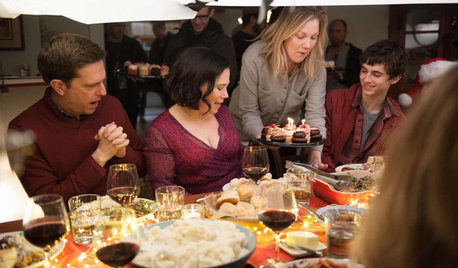What is it with dysfunctional families??
martin_z
17 years ago
Related Stories

KITCHEN DESIGNKitchen of the Week: Drab and Dysfunctional to Radiant in Minnesota
Clunky storage and lackluster floors get nixed in favor of open shelves, plaid vinyl and an effective kitchen work triangle
Full Story
BEFORE AND AFTERSMore Storage and Light for a Seattle Kitchen
Removing walls and replacing dysfunctional features give a kitchen a bright look and better function
Full Story
CONTEMPORARY STYLEHouzz Tour: Sophistication and Style in a Compact London Flat
A dysfunctional Victorian-era apartment gets a glamorous update that reconfigures rooms and adds visual interest
Full Story
BATHROOM MAKEOVERSInside Houzz: A Chopped-Up Bathroom Goes Streamlined and Swank
Dysfunctionally divided and dated too, this bath needed major help. The homeowner found it on Houzz
Full Story
LIFEWorld of Design: See How 7 Families Live in Multigenerational Homes
What happens when three or more generations live within shouting distance of one another? More hugging than shouting, actually
Full Story
KITCHEN DESIGNKitchen of the Week: Function and Flow Come First
A designer helps a passionate cook and her family plan out every detail for cooking, storage and gathering
Full Story
FEEL-GOOD HOMESimple Pleasures: Treasuring the Gift of Grandparents
You can enrich your family life by bringing generations together for shared meals, quilting projects, storytelling
Full Story
TASTEMAKERSSet Design: Behind-the-Scenes Look at ‘Love the Coopers’
Production designer Beth Rubino talks about creating the family home for the new movie — and the home in ‘Something’s Gotta Give’
Full Story
FRANK LLOYD WRIGHTWhat Frank Lloyd Wright's Own House Tells Us
The buildings dreamed up here changed the course of architecture — and Wright's home was no less a design lab than the studio itself
Full Story
KITCHEN DESIGN9 Ways to Avoid Kitchen Traffic Jams
Rubbing elbows with chefs isn't always a boon. Consider circulation pathways for a kitchen that lets everyone work in comfort
Full Story


Chris_in_the_Valley
kathy_t
Related Discussions
Dysfunctional sewing machine question
Q
My other most hated commercial
Q
Another family in my family plot
Q
Which dining table to choose as a family table. Family includes kids
Q
cindydavid4
martin_zOriginal Author
friedag
woodnymph2_gw
georgia_peach
sheriz6
carolyn_ky
yoyobon_gw
ccrdmrbks
smallcoffee
inkognito
ccrdmrbks
martin_zOriginal Author
colormeconfused
ccrdmrbks
vickitg
rosefolly
martin_zOriginal Author
kathy_t
ccrdmrbks
martin_zOriginal Author
colormeconfused
yoyobon_gw
cindydavid4
yoyobon_gw
Bumblebeez SC Zone 7
inkognito
martin_zOriginal Author
inkognito
ccrdmrbks
vickitg
ccrdmrbks
martin_zOriginal Author
annpan
ccrdmrbks
anyanka
yoyobon_gw
cindydavid4
cindydavid4
Bumblebeez SC Zone 7
MusicMom
cindydavid4
twobigdogs
martin_zOriginal Author
Kath
ccrdmrbks
cindydavid4
Bumblebeez SC Zone 7